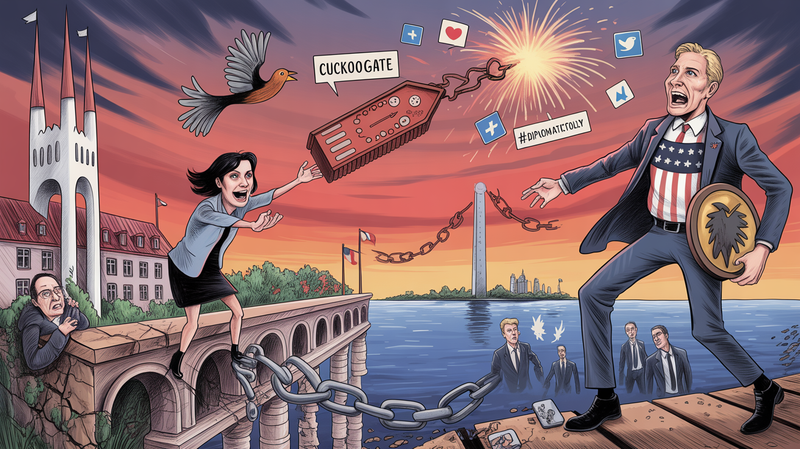Vision of a Strong and Independent Estonia in the European Parliament: Vsevolod Jürgenson’s Electoral Platform
Why I am running for the European Parliament As I campaign for the European Parliament, my aim is to stand not just in words, but with all the means available to a Member of Parliament, for the independence and interests of the Estonian state. Here are the principles I intend

Why I am running for the European Parliament
As I campaign for the European Parliament, my aim is to stand not just in words, but with all the means available to a Member of Parliament, for the independence and interests of the Estonian state.
Here are the principles I intend to defend if elected:
The European Union must abandon its ambitions for a federal state and return to the principles of a union of states.
The biggest problem for the European Union in recent years has been the accelerated movement from a union of states towards a federal state. This comes with the European Union’s pressure on member states’ governments and the forceful establishment of uniform rules, without considering the peculiarities and national interests of the member states. The supremacy of European laws must be replaced by cooperation and the negotiation of common ground that meets the expectations and interests of the peoples living in the union. The European Union must not interfere in local politics with fines or criticism directed at governments of member states. Under no circumstances should the current consensus-based decision-making procedure be abolished, replacing it with a majority vote that would allow large countries to impose their will on smaller partners.
The European Union needs to become more respectful of democratic rules, where even higher officials are elected by the people.
The European Parliament is the only directly elected institution of the EU. This does not characterize the union from the best democratic perspective. In addition to the Parliament, citizens of the countries should have the right to elect Union leaders and to recall them in the event of a trust crisis. Only then can we talk about democracy in its true sense.
In the most important issues affecting citizens’ welfare, referendums must be conducted, the results of which become mandatory for the EU’s governing bodies.
Only as a democratic union of free states does the EU retain its purpose, without becoming a tool for political interest groups to push through their ambitions.
The human trafficking under the guise of migration must be stopped in the EU.
The EU must end its open borders policy and protect its territory and residents from the overwhelming flood of migration that threatens both security and the European way of life.
There is no justification for a policy that favors human trafficking. Those in distress must be supported in their countries of location, not by facilitating the dark business of human traffickers smuggling opportunists across the Mediterranean. Instead of devising plans for the distribution of migrants, an operational border guard must be put to work. The ability to protect borders is proven by Lithuania’s commendable action in stopping the flow of migrants from Belarus and Finland’s firm behavior on its eastern border. The migration onslaught on the Mediterranean must be stopped just as effectively.
The EU’s green hysteria must end.
The EU’s so-called green measures have turned from an environmental program that favors nature conservation into a green hysterical ideological attack, the results of which are the opposite of what is desired. Production moves from Europe, which implements extreme environmental measures, to Asia and Africa, where lax rules allow for more polluting production at lower costs. The result is an increase in global pollution, exacerbated by increasingly lengthy supply chains.
The situation in which EU documents assess carbon dioxide reduction measures only by evaluating the CO2 emissions of mufflers, instead of approaching the evaluation of the decarbonization effect through the so-called WtW (well-to-wheel) method, does not reveal a genuine nature-saving mindset. For example, the footprint of battery cars may turn out to be significantly more polluting than that of biomethane-using internal combustion engines from the mining of metals to the disposal of batteries, but EU regulations do not take this into account. Transport, energy, and industry have been approached just as irresponsibly.
Green hysteria must be replaced with motivated and justified ideology-free and country-specific nature-saving approaches. The price of EU green hysteria is a decline in living standards and a decrease in the competitiveness of European countries, which must be stopped.
The number of Members of Parliament must be made equal by country.
The European Parliament has 705 members. The number of representatives depends on the size of the member state. Thus, smaller Cyprus and Luxembourg are represented by 6 members, tiny Estonia by 7, while Germany has 96 voices in the European Parliament, France 79, and Italy 76. The current structure of the European Parliament clearly discriminates against smaller states, and for the principles of equal treatment and democratic representation to be upheld, the number of seats should be distributed equally among the countries. There could be 20 seats for each of the 27 member states in the European Parliament, which would help bring the number of representatives down from 540, thereby increasing the responsibility of each representative. Equal distribution of seats would ensure fair representation of countries and prevent large countries from imposing their will on smaller ones. Democracy would win, Europe would win.
Let us consider primarily the interests of Estonia and the needs of its people in the European Union!
Vsevolod Jürgenson




